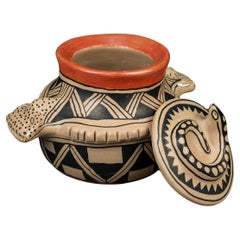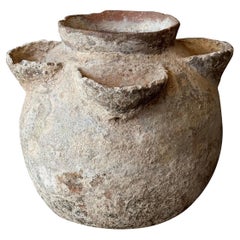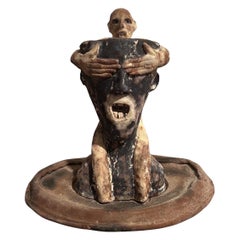Brazil Modernist Pottery
to
1
1
1
1
1
1
1
1
1
1
Wauja/ Apulata. Céramique Indigène Brésilienne, 2022.
Located in PARIS, FR
This piece of native Brazilian ceramics, created by the Wauja tribe of the Haut-Xingu Park, skillfully combines tradition and contemporaneity. Made according to ancestral methods and...
Category
2010s Brazilian Primitive Pottery
Materials
Ceramic, Pottery
Related Items
Primitive Terracotta Water Jar From Central Mexico, Early 20th Century
Located in San Miguel de Allende, Guanajuato
Primitive terracotta water jar from Central Mexico, Early 20th Century
Category
Early 20th Century Mexican Primitive Pottery
Materials
Ceramic, Clay, Terracotta
1998 Wesley Anderegg Raku Fired Figural Earthenware Cup / Saucer Set
Located in Atlanta, GA
Rare Wesley Anderegg 1998 Raku Fired Figural Earthenware Cup / Saucer Set!.
Fully signed to underside of cup.
7.375” h x 6.75” w x 4” d
Very ...
Category
20th Century Pottery
Materials
Ceramic
$1,200 Sale Price
20% Off
H 7.375 in W 6.75 in D 4 in
Antique Guatemalan Majolica Bowls
Located in Los Angeles, CA
These are sold separately. Please refer to which piece you are interested in at purchase. Early 20th c Majolica bowls from Guatemala. Great colors. Diameter varies from about 5.5 inc...
Category
Early 20th Century Guatemalan Spanish Colonial Pottery
Materials
Majolica
Large French Provincial Pottery Urn / Vase / Pitcher, 18th Century
Located in New York, NY
A timeless, Classic French 18th century provincial pottery / ceramic urn or pitcher with beautiful, natural time worn patina and a stunning form featuring three dramatic handles and ...
Category
Antique 18th Century French French Provincial Pottery
Materials
Pottery
Tim Orr French 1960s Art Pottery Table Lamp
By Tim Orr
Located in New York, NY
An excellent French mid century sculptural art pottery table lamp by Tim Orr.
Signed. The vase measures 8.5” H x 8.5” W x 4” D.
Biography:
orn in England, Tim Orr is a sculptor, ...
Category
Vintage 1960s French Mid-Century Modern Table Lamps
Materials
Pottery
Antique Winchell & Davis Importing Co. of Albany, NY Stoneware Whiskey Jug C1880
Located in Big Flats, NY
Antique Winchell & Davis Importing Co. Of Albany, NY Stoneware Whiskey Jug with Blue Lettering Signed C1880.
Measures - 14"H x 8.5"W x 8.5"D.
This antique stoneware whiskey j...
Category
Antique 19th Century Pottery
Materials
Stoneware
$600 Sale Price
20% Off
H 14 in W 8.5 in D 8.5 in
Wabi Sabi Clay Bowl
Located in Saint Petersburg, FL
Antique terracotta clay bowl. Subtle imperfections, symbolizing its age, usage & beauty of natural decay.
Category
20th Century Unknown Primitive Pottery
Materials
Clay
Antonia Campi Conchiglia Pottery, Italian 1950s Lamp
By Lavenia, Antonia Campi
Located in New York, NY
An original 1950s Conchiglia glazed ceramic lamp in the form of a conch shell.
Societa Ceramica Italiana di Laveno. Signed.
Category
Vintage 1950s Italian Mid-Century Modern Table Lamps
Materials
Porcelain
Primitive Terracotta Water Jar From Mexico
Located in San Miguel de Allende, Guanajuato
Primitive terracotta water jar from Central Mexico, early 20th century.
Category
Early 20th Century Mexican Primitive Pottery
Materials
Ceramic, Clay, Terracotta
American Large Hand Painted Oil Jar
Located in San Francisco, CA
A very large hand-painted art pottery oil jar with floral decoration. American, early to mid-20th century.
Category
20th Century American Planters and Jardinieres
Materials
Pottery
Two Ancient Khmer Tribal Urns / Amphoras
Located in New York, NY
Two ancient tribal urns / amphora / pottery / vases / pitchers / ceramics from the ancient khmer region (present day cambodia).
Category
Antique 18th Century and Earlier Cambodian Tribal Pottery
Materials
Clay
Théière en céramique bicolore style Art Déco Française
Located in London, England
Cette magnifique théière en céramique française arbore un design bicolore qui évoque des contes de fées. Avec sa forme élégante, on pourrait presque s'imaginer qu'elle est la lampe d...
Category
21st Century and Contemporary European Art Deco Pottery
Materials
Ceramic


